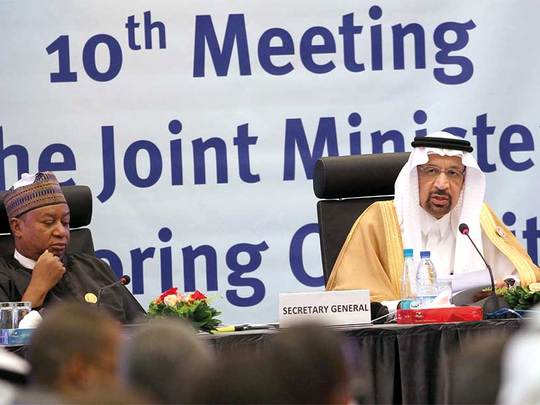
Abu Dhabi: Opec and no-Opec members including Russia have decided there will be not be any additional increase in supply to offset falling Iranian oil exports in a rebuff to US president Donald Trump’s calls for increasing output to bring down oil prices.
Ministers and officials from the Organisation of the Petroleum Exporting Countries (Opec) and its allies gathered in Algerian capital on Sunday to review output data and discuss current situation in oil markets.
Saudi oil minister Khalid Al Falih said the country had spare capacity to increase oil output but no such move was needed at the moment. “My information is that the markets are adequately supplied. I don’t know of any refiner in the world who is looking for oil and is not able to get it,” Al Falih was quoted as saying by Reuters during a meeting of oil ministers in Algiers.
Falih also said returning to 100 per cent compliance was the main objective and should be achieved in the next two to three months.
“We have the consensus that we need to offset reductions and achieve 100 per cent compliance, which means we can produce significantly more than we are producing today if there is demand,” he said.
Opec, Russia and other allies agreed a deal in December 2016 to cut supply, but after months of cutting by more than the pact had called for, they agreed in June to boost output by returning to 100 per cent compliance which equates to about one million barrels per day.
- Khalid Al Falih | Saudi Energy Minister
UAE Energy minister Suhail Al Mazroui also said that the country has spare production capacity but won’t overuse it, and right now the market is in “good condition.”
The comments come as supply concerns intensify due to the decision of the US government to reimpose sanctions on Iran, a top oil producing country.
US president Donald Trump renewed sanctions on Iran earlier this year and asked countries to stop importing oil from Iran from November or face US sanctions.
Many countries like India have already reduced imports from Iran to avoid being penalised by the US government.
“Crude oil remains supported and at risk of breaking higher as supply concerns intensify,” said Ole Hansen, head of commodity strategy at Saxo Bank.
“Despite increased production from some Opec members and Russia together with robust US export sales of crude, the market is turning increasingly tight. Iranian exports have already witnessed a sharp reduction and are likely to fall further when US sanctions come into effect in November.”
Iran, which is one of the important members of the Opec produces about 3.8 million barrels of oil per day, of which it exports about 2.8 million barrels of oil per day to various countries including China, India and a number of countries in Europe. Iranian exports are expected to reduce by 30 to 40 per cent due to sanctions.
Global benchmark, Brent is trading near $79 per barrel and US crude West Texas Intermediate at $71 per barrel. Brent crude rose above $80 per barrel last week.
US President Trump criticised Opec for not doing enough to lower oil prices in a tweet last week.
“We protect the countries of the Middle East, they would not be safe for very long without us, and yet they continue to push for higher and higher oil prices! We will remember. The Opec monopoly must get prices down now!” Trump wrote on Twitter.
— With inputs from Bloomberg, Reuters












